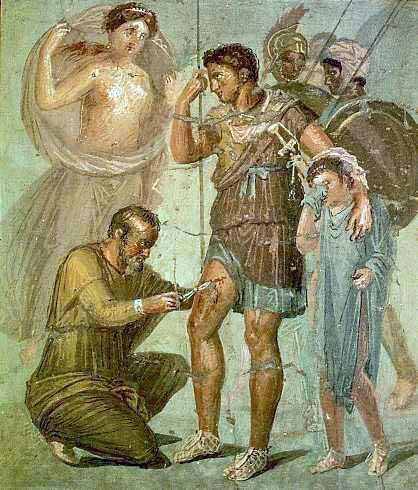Give and Take

In an SRD-based system, non-magical healing is all about skill checks. Heal checks, Knowledge checks, and Craft: Alchemy checks form the basis of putting people back together when one doesn't have the benefit of the powers of the gods. Obviously, when someone's life depends on whether a healer applies the bandages correctly on the first try, it becomes important to succeed on those checks, and this begs the question: should a healer be allowed to take 20?
A little more than four years ago, Eris Lis, M.D., began writing a series of brilliant and informative posts on RPGs through the eyes of a medical professional. Following is the tenth of them, which appeared here on February 16, 2013.
In an SRD-based system, non-magical healing is all about skill checks. Heal checks, Knowledge checks, and Craft: Alchemy checks form the basis of putting people back together when one doesn't have the benefit of the powers of the gods. Obviously, when someone's life depends on whether a healer applies the bandages correctly on the first try, it becomes important to succeed on those checks, and this begs the question: should a healer be allowed to take 20?
The classic SRD explains taking 20 as follows: assuming a person has sufficient time to make a check 20 times, and "the skill being attempted carries no penalties for failure," you can take 20. As it explains, this assumes that you fail up to nineteen times, incurring whatever penalties would come from failure. The Pathfinder SRD says essentially the same thing; the best "take 20" skills are subtly different, but the rules are pretty much identical, including the important point about incurring the penalties of failure several times. The issue of failure is the single point which, in my experience, most determines what skills can and cannot work this way. The SRDs cite searching a room or picking a lock as actions which naturally predispose themselves to taking 20. Skills such as Disable Device tend to be contentious in gaming groups that I've been in. Consider the rogue carefully disarming a trap. On the one hand, the rules clearly dictate that someone disabling a trap has a risk of setting the trap off and suffering the consequences, but on the other hand, you'd like to assume that a rogue who has the time and the patience would spend a long time looking at the trap and considering their approach before poking it. Some GMs I've played with would allow that rogue to take 20 on disabling the trap, because it represents taking the time to do the job carefully and correctly, while others would disallow it because it represents the rogue just jabbing a tool at the mechanism twenty times and hoping for the best. The climb check is another contentious one; does taking 20 mean carefully testing every handhold before putting your weight on it, or does it mean starting again from the bottom after falling off nineteen times?
Consider how this applies to non-magical healing. Suppose that a healer wants to bind a companion's wounds. Generally, there's no penalty for failing this check, so it's perfect chance to take 20. What if the healer is trying to perform a surgical procedure, though, as per the rules in Insults & Injuries? Logically, a failed surgical check has consequences: sutures fail to hold a wound closed, or a wound becomes infected, or in a really bad situation, a surgeon cuts a nerve or a blood vessel by mistake. There's a reason that in real life, even fairly simple surgeries can take upwards of an hour and complex surgeries can take an entire day or more, and the reason is this: the surgeons are often taking 20. They do things slowly and carefully. In handyman terms, they measure twice and cut once. Back when I was a medical student, I had the experience of standing for a good twenty minutes holding an abdominal incision open while the surgeons very, very carefully traced some delicate and hard-to-see structures to make certain they cut the right bit, and only the right bit. As a surgeon becomes more and more skilled, this goes faster and faster, but the principle remains much the same.
Here's a related example: calculating the dose of a medicine to heal a creature. Logically, failing the check to calculate the dose of a medication has a consequence, albeit not an immediate one: someone gets the wrong dose of a medicine and either doesn't have enough of a benefit, or suffers an overdose. Despite there being a negative consequence, this might be a sensible place for a creature to be able to take 20. A regular check reflects the apothecary's general knowledge that a creature of size X with a certain disease should receive Y milligrams of medicine, whereas taking 20 reflects the apothecary taking a creature's weight, checking the relevant texts to verify which medicine to give, measuring out the correct amount and double-checking it before giving it to the person, etc.
As with so many things in life, it's probably best decided on a case by case basis and comes down to the merciful nature and common sense of your GM. If you're like me, that prospect terrifies you.
Dr. Eric Lis is a physician, gamer, and author of the Skirmisher Publishing LLC OGL sourcebook Insults & Injuries, which is also available for the Pathfinder RPG system.






